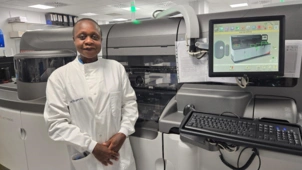
What inspired you to become a biomedical scientist?
I often visited a relation who ran a medical practice, within a building that was home to various medical services. One day, needing a test, I discovered one of those rooms was a clinical lab. At the reception where I went to deliver my specimen, a woman who I had become familiar with from my visits greeted me, and during our chat I learnt that she worked in the laboratory. When I shared that I was still undecided about my career path and awaiting my A-level results, she invited me to visit the lab. A few weeks later I found myself in a microbiology laboratory with biomedical scientists - I was thoroughly fascinated and intrigued. That experience was the clincher: I was going to a biomedical scientist!
What’s a typical day like for you in the lab?
Biomedical Scientists analyse a variety of biological specimens and provide information and blood products essential to patient care. Given the importance of this work, quality systems and procedures are embedded in everything we do. Each day, we check performance of our tests at various intervals, carry out essential equipment maintenance, and investigate and resolve any performance issues. We prepare specimens for analysis, then conduct the analysis using a range of routine and specialised equipment and techniques, depending on the test required. Results are then reviewed, verified, and interpreted as required before reporting. In some cases, we communicate findings directly to the requestors. Timely delivery of accurate results or the correct blood products is critical, so turnaround times are one of the key performance indicators we monitor closely.
Every day is different, but it’s always a combination of challenge, excitement and most importantly, at the end of each shift the satisfaction of knowing that our work has made a difference in someone’s life.
What’s one thing the public might not know about biomedical science?
Most people are not aware that laboratory results inform 70 – 80% of clinical decisions which follow. This means Biomedical Scientists play a critical, though often behind-the-scenes, role in patient care. From diagnosing infections, monitoring chronic conditions, and guiding treatment choices to ensuring safe blood transfusions—our work directly supports doctors and other healthcare professionals in making informed decisions. Without the accuracy, speed, and reliability of lab results, many diagnoses would be delayed or missed altogether.
What’s a recent advancement in biomedical science that excites you?
The introduction of AI presents a host of possibilities that could provide efficiencies and improve analytical capabilities all of which would contribute to better outcomes and experience for patients. I am excited to see how our services will adopt and apply this technology.
What advice would you give to someone considering a career in biomedical science?
It is one of the most rewarding careers. Biomedical science is a constantly evolving field, and being adaptable is key. Take any opportunity to shadow professionals, visit labs, or attend events and open days. These experiences can help you understand the different specialisms and find your area of passion. It’s also important to remember that while we may not always see patients directly, our work has a real and immediate impact on their lives.